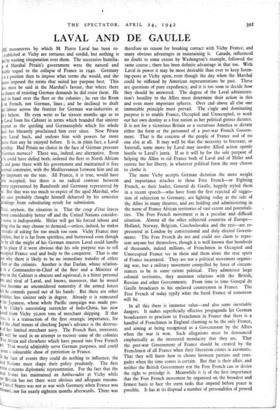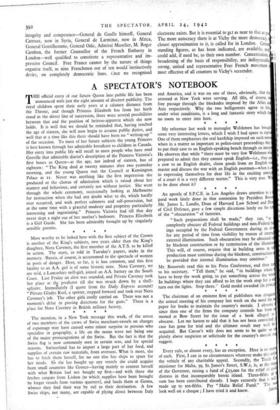LAVAL AND
DE GAULLE
HE manoeuvres by which M. Pierre Laval has been re- established at Vichy are tortuous and sordid, but nothing is by wasting vituperation over them. The successive humilia- of Marshal Petain's government were the natural and 'table sequel to the collapse of France in 1940. Germany In a position then to impose what terms she would, and she rse imposed the terms that suited her purpose best. This a must be said in the Marshal's favour, that where there chance of resisting German demands he did resist them. He to hand over the fleet or the colonies ; he ran the Riom on French, not German, lines ; and he declined to draft labour across the frontier for German war-industries at 's behest. He even went so far sixteen months ago as to Laval from his Cabinet in terms which branded that sinister rgnat as the quisling and Germanophile which his whole uct has blatantly proclaimed him ever since. Now Petain ves Laval back, and endows him with powers far more sive than any he enjoyed before. It is, in plain fact, a Laval torship. Had Petain no choice in the face of German pressure German menace? There was, indeed, one alternative. Even he could have defied both, ordered the fleet to North African , and gone there with his government and maintained it free ernal constraint, with the Mediterranean between him and an impotent on the seas. All France, it is true, would have me occupied, but there is no radical contrast between any represented by Rundstedt and Germany represented by I. But that was too much to expect of the aged Marshal, who . any case probably thought himself debarred by his armistice makings from substituting revolt for submission.
ere, anyhow, the situation is. That the coup d'etat leaves any considerably better off and the United Nations consider- worse is indisputable. Hitler will get his forced labour and g else he may choose to demand,—unless, indeed, he makes' mistake of asking for too much too soon. Vichy France may helpless, but it is far from spiritless, and buttressed even though be by all the might of his German masters Laval could hardly his place if it were obvious that his sole purpose was to sell copied France soul and body to the conqueror. That is one n why there is likely to be no immediate transfer of either fleet or the colonies. Another is that Darlan, whose relation- to a Commander-in-Chief of the fleet and a Minister of e in the Cabinet is obscure and equivocal, is a bitter personal y and rival of Laval, and knows, moreover, that he would once become an unconsidered nonentity if the armed forces h.he controls passed out of his hands. But there are other abilities less sinister only in degree. Already it is rumoured MI the Japanese, whose whole Pacific mmpaign was made pos- it by Vichy's unresisting surrender of Indo-China, has now limed from Vichy 50,000 tons of merchant shipping. If that toe, it is a transaction of the first strategic importance, for of the chief means of checking Japan's advance is the destruc- of her limited merchant navy. The French fleet, moreover, tit well be used in an attempt to recover some of the colonies pit Africa and elsewhere which have passed into Free French b1S • That would admirably serve German purposes, and could given a colourable show of patriotism in France. • !ft the face of events they could do nothing to influence, the nett Nations must shape their policy prudently. The first soon concerns diplomatic representation. For the fact that the trod States has maintained an Ambassador at Vichy while eat Britain has not there were obvious and adequate reasons. !tinned States was not at war with Germany when France was utimed, nor for nearly eighteen months afterwards- There was therefore no reason for breaking contact with Vichy France, and many obvious advantages in maintaining it Canada, influenced no doubt to some extent by Washington's example, followed the same course ; there has been definite advantage in that too. With Laval in power it may be more desirable than ever to keep listen- ing-posts at Vichy open, even though the day when the Marshal could be stiffened by American representations be past. These are questions of pure expediency, and it is too soon to decide how they should be answered. The degree of the Laval administra- tion's hostility to the Allies must determine their action in this and even more important spheres. Over and all else one immutable principle must prevail. The single and dominating purpose is to enable France, Occupied and Unoccupied, to work out her own destiny as a free nation as her political genius dictates.
It is not for a victorious Britain or a victorious America to dictate either the form or the personnel of a post-war French Govern- ment. That is the concern of the people of France and of no one else at all. It may well be that the necessity to frustrate, or forestall, some move by Laval may involve Allied action openly hostile to Laval's junta. If so it will be for the sole purpose of helping the Allies to rid France both of Laval and of Hitler and restore her her liberty, in whatever political form she may choose to clothe it.
The more Vichy accepts German dictation the more weight and importance attaches to those Free French—or Fighting French, as their leader, General de Gaulle, happily styled them in a recent speech—who have from the first rejected all sugges- tion of subjection to Germany, are fighting today at the side of the Allies in many theatres, and are holding and administering in the name of France African territories of vast extent and potentiali- ties. The Free French movement is in a peculiar and difficult situation. Almost all the other subjected countries of Europe— Holland, Norway, Belgium, Czechoslovakia and the rest—are re- presented in London by constitutional and duly elected Govern- ments. The Free French do not and could not claim to repre- sent anyone but themselves, though it is well known that hundreds of thousands, indeed millions, of Frenchmen in Occupied and Unoccupied France see in them and them alone the true spirit of France incarnated. They are not a political movement organis- ing war, but a military movement compelled by force of circum- stances to be to some extent political. They administer large colonial territories, they maintain relations with the British, Russian and other Governments. From time to time General de Gaulle broadcasts to his enslaved countrymen in France. The Free French of today typify what the freed France of tomorrow will be.
In all this there is immense value—and also some inevitable dangers. It makes superficially effective propaganda tor German broadcasters to proclaim to. Frenchmen in France that there is a handful of Frenchmen in England claiming to be the only France, and aiming at being recognised as a Government by the Allies when the war is won. Such allegations must be denounced emphatically as the interested mendacity that they are. That the post-war, Government of France should be created by the Frenchmen Of all France when their liberation comes is axiomatic. That they will know how to choose between patriots and rene- gades when the time comes is certain. But that is their affair, and neither the British Government nor the Free French can or desire the right to prejudge it. Meanwhile it is of the first importance that the Free French movement be organised on the broadest and firmest basis to face the stern tasks that impend before peace is possible. It has at its disposal a number of personalities of proved integrity and competence—General de Gaulle himself, General Catroux, now in Syria, General de Larminat, now in Africa, General Gentilhomme, General Odic, Admiral Muselier, M. Roger Cambon, the former Counsellor of the French Embassy in London—well qualified to constitute a representative and im- pressive Council. Free France cannot by the nature of things organise itself, as nine Frenchmen out of ten would -instinctively desire, on completely democratic lines. s:nce no recognised electorate exists. But it is essential to get as near to that as The more autocracy there is at Vichy the more democracy, closest approximation to it, is called for in London. Ce standing figures, as has been indicated, are available, and could add, if need be, to their own number. Concentration, broadening of the basis of responsibility, are indispensa strong, united and representative Free French movement most effective of all counters to Vichy's surrender.























 Previous page
Previous page